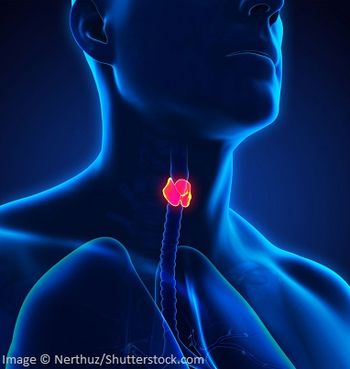
Oncology NEWS International
- Oncology NEWS International Vol 4 No 9
- Volume 4
- Issue 9
Thyroid Cancer Funds Go to New Jersey Center
NEWARK, NJ--The Garden State Cancer Center has received a research grant of $605,000 from the FDA to develop a new treatment for medullary thyroid carcinoma. "The new therapy is based upon antibodies we have developed that target this cancer very selectively," said Dr. Malik Juweid, director of nuclear medicine and principal investigator on the grant.
NEWARK, NJ--The Garden State Cancer Center has received a researchgrant of $605,000 from the FDA to develop a new treatment formedullary thyroid carcinoma. "The new therapy is based uponantibodies we have developed that target this cancer very selectively,"said Dr. Malik Juweid, director of nuclear medicine and principalinvestigator on the grant.
"In a series of more than 30 patients, we have shown thatby using radioactive isotopes attached to the antibodies, we cannot only find sites of this cancer when other methods have failed,but also approach therapeutically effective doses," Dr. Juweidsaid. The grant will support the research efforts of two seniorstaff as co-investigators and five technicians.
"We're pleased that the FDA has the vision to support researchto develop therapies for less common diseases such as medullarythyroid carcinoma," said Dr. David M. Goldenberg, founderand president of the Center.
Center to Relocate
The Garden State Cancer Center is the clinical division of theCenter for Mo-lecular Medicine and Immunology (CMMI), which specializesin the development of monoclonal antibodies for the detection,diagnosis, and treatment of many forms of cancer.
CMMI, currently housed at the University of Medicine and Dentistryof New Jersey, has received a $10.5 million Department of Energygrant to allow relocation to the site of the former Essex CountyGeriatric Center in Belleville.
Articles in this issue
over 30 years ago
New Probe Detects Fusion of bcr/ablover 30 years ago
Avon's Breast Cancer Crusade to Offer 'Pink Ribbon' Pensover 30 years ago
Take a Behind the Scenes Look at ODACover 30 years ago
Michigan Cancer System Named for Womanover 30 years ago
High-Dose Chemo Patients to Get Stem Cells With the MDR-1 Geneover 30 years ago
Report on Minority Health Finds Few Black Oncologistsover 30 years ago
Where Are We Going and What Questions Do We Need to Ask?over 30 years ago
Hodgkin's Disease Patients Sought for Trial of MoAbNewsletter
Stay up to date on recent advances in the multidisciplinary approach to cancer.



































